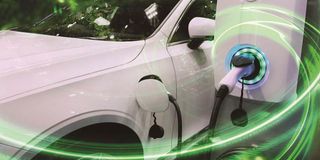Fact Check: Electric cars are greener, but have a downside

Electric vehicle at charging station with the power cable supply plugged in on blurred nature with green enegy power effect. Eco-friendly sustainable energy concept.
Electric vehicles, which are partially or fully powered on electric power have gained global popularity in the recent past as one of the solutions to curbing greenhouse emissions.
Also referred to as battery electric vehicles, they have an electric motor instead of a combustion engine, and emit no exhaust from a tailpipe.
On social media, some users have claimed that electric cars are bad for the environment, citing high energy consumption.
One user said: “Electric cars use a lot of energy to power their motors, and this energy can potentially be sourced from environmentally harmful sources such as coal or oil. Additionally, electric cars emit pollutants such as greenhouse gases, which are harmful to the environment. Electric cars are not a long-term solution to the environmental crisis, and they should not be promoted as such.”
This claim is however false, as electric cars produce no greenhouse emissions, and have lower fuel costs than similar conventional vehicles, according to Alternative Fuels Data Centre(AFDC).
However, the claim that energy to power the motors can be sourced from environmentally harmful sources is true, since in many parts of the world, the electricity that helps the EV run is sourced from fossil fuels.
Even though electric vehicles do not directly produce greenhouse gases, their manufacture generates emissions.
A study that was conducted by the Massachusetts Institute of Technology Energy Initiative found that producing a battery for an electric vehicle generates higher emissions than the manufacturing of an automobile.
However, as compared to total greenhouse emissions produced by gasoline powered vehicles, the total greenhouse emissions associated with the manufacturing, charging and driving of an electric vehicle for its entire lifetime are lower, according to the Environmental Protection Agency(EPA).
Another downside of electric vehicles is their lithium ion batteries whose manufacture necessitates mining of raw materials like nickel, copper, cobalt and lithium.
Besides the mining being energy intensive, it is also blamed for causing degradation of the environment and deforestation, water and soil contamination, health issues, child labor and disrupting wildlife habitats.
“Recycling EV batteries can reduce the emissions associated with making an EV by reducing the need for new materials. While some challenges exist today, research is ongoing to improve the process and rate of EV battery recycling,” says EPA.
According to Young People’s Trust for the Environment (YPTE) electric vehicles are only as green as their power sources.
Environmental impact
“The environmental impact of an electric car can increase or decrease considerably depending on how the electricity that charges its battery is made.
A coal-fired power station emits 800-850 grams of CO2 per kWh (recent estimates suggest this may be lower, at 650g per kWh), whilst a cleaner, gas-fired power station emits 350-400g CO2 per kWh,” says YPTE.
“Using renewable energy, like solar panels or wind turbines, around 36g CO2 is emitted per kWh, taking into account the emissions created during their manufacturing process.
So if a car is recharged using renewable energy, its negative impact on the environment is far lower than if it’s charged using electricity from a coal-fired power station,” adds YPTE.
This fact check was produced by Nation with support from Code for Africa’s Pesa Check, International Fact Checking Network, and African Fact Checking Alliance Network.





